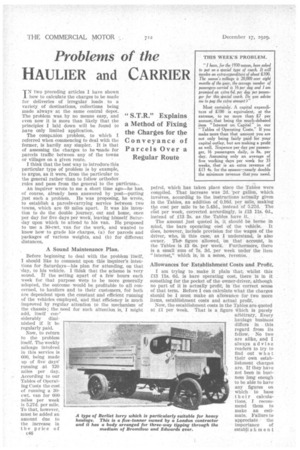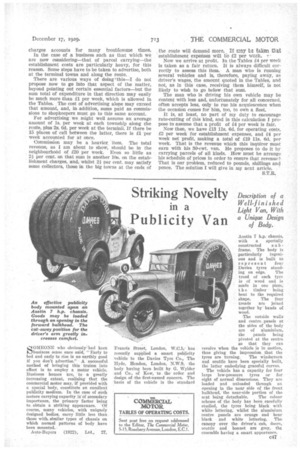Problems of the
Page 68

Page 69

If you've noticed an error in this article please click here to report it so we can fix it.
HAULIER and CARRIER
" S.T.R." Explains a Method of Fixing the Charges for the Conveyance of Parcels Over a Regular Route
two preceding articles I have shown
how to calculate the charges to be made for deliveries of irregular loads, to a variety of destinations, collections being made always at the same central depot. The problem was by no means easy, and even now it is more than likely that the principles I laid down will be found to have only limited application.
The companion problem, to which I referred when commencing to deal with the former, is hardly any simpler. It is that of assessing the charges to be -made for parcels traffic between any of the towns or villages on a given route.
I think that the best way to introduce this particular type of problem is by example, TO argue, as it were, from the particular to
the general rather -than to follow orthodox rules and pass from the general to the particuiaL.
An inquirer wrote to me a short time ago—he has, of course, already been answered by post—putting just such a problem. He was proposing, he wrote, to establish a parcels-carrying service between two towns, which are 60 miles apart. It was his intention to do the double journey, out and home, once per day for five days per week, leaving himself Saturday upon which to attend to his van. He proposed to use a 30-cwt. van for the work, and wanted to know how -to grade his charges, (a) for parcels and packages of various weights, and (b) for different distances.
A Sound Maintenance Plan.
Before beginning to deal with the problem itself,
should like to comment upon this -inquirer's intentions for Saturdays—his plan for attending, on that -day, to his vehicle. I think that the scheme is very sound. if the setting apart of a few hours each week for that purpose were to be more generally adopted, the outcome would be profitable to all concerned, to hauliers and to their customers, for both are dependent upon the constant and efficient running of the vehicles employed:and ;that efficiency is much improved by regular attention to the mechanism of the chassis; the need for such attention, is, I might add, itself con
siderably diminished if it be regularly paid.
Now, to return to the problem itself. The weekly mileage inVolved in this service is 600, being made up of five days' running at 120 miles per day. According to our Tables of Operating Costs the cost of running a 30cwt. van for 600 miles per week is 5.27d. per mile To that, however, must be added an amount due to the increase in the price of c46
petrol, which has taken place since the Tables were compiled. That increase was 2d. -per gallon, which involves, according to the instructions actually given in the Tables, an addition of 0.160. per mile, making the cost per mile to be 5.43d., instead of 5.27d. The ci5st per week, corrected accordingly, is £13 us. 6d., instead of £13 Be. as .the Tables have it.
.
The amount just quoted is, it should be borne in mind, the bare operating cost of the vehicle. It does, however, include provision for the wages of the driver, who, in this case, as I understand, is also owner. Thefigure allowed, On that account, in the Tables is £3 6s. per week. Furtherniore, • there is a small sum of 7s. 3d. per week under the item
"interest," which is,in a sense, revenue. . .
Allowances for Establishment Costs and Profit.
I am trying to make it plain that; whilst this £13 lie. 6d. is bare operating cost, there is in it something for the pocket of the .owner-driver, although no part of it is actually profit, in the correct sense of that term. Before I can calculate what the charges should be I must make an aIkiWance for two more items, establishment costs and actual profit.
. Now, the establishment costs in the Tables are quote
at 1.1 per Week. That is a figure .i7hich is purely arbitrary. Every haulage business differs in this regard from its fellow. No two are alike, and I always advise readers to try to find out what their own establishment charges are. If they have not been in business long enough to be able to have any figures on which to base their calculations, I recommend them to make an estimate. Failure to appreciate the importance of establi s ii in ent
charges accounts or many troublesome times.
In the case of a business such as that which we are now considering—that of parcel carrying—the establishment costs are particularly heavy, for this reason. Some steps have to be taken to advertise, both at the terminal towns and along the route.
There are various ways of doing 'this—I do not propose now to go into that aspect of the matter, beyond pointing out certain essential factors—but the sum total of expenditure in that direction may easily be much more than 1.1 per week, which is allowed in the Tables. The cost of advertising alone may exceed that amount, and, in addition, sums paid as commissions to shopkeepers must go to this same account.
For advertising we might well assume an average amount of is. per week at each township along the route, plus 2s. Cel. per week at the terminii. If there be • 15 places of call between the latter, there is 'per • week accounted for at once.
• Commission may be a heavier. item. The total revenue, as I am about to show, should be in the neighbourhood of £20 per week. Even so little as 21 per cent. on that sum is another 10s, on the establishment charges, and, whilst 2i per cent. may satisfy some collectors, those in the big towns at the ends of
the route will demand more„ If My Le taken that establishment expenses Will be £2 per Week Now we arrive at profit. In the Tables £4 per week is taken as a fair return. It is always difficult correctly to assess this item. A man who is running several vehicles and is, therefore, paying away, as driver's wages, the amount quoted in the Tables, and not, as in this ease, receiving them himself, is not likely to wish to go below that surd.
The man who is driving his own vehicle may be content with less and, unfortunately for all concerned, often accepts less, only to rue his acquiescence when the occasion comes for him, too, to own a fleet.
It is, at least, no part of my duty to encourage rate-cutting of this kind, and in this calculation I propose to assume that a profit of £4 per week is fair.
Now then, we have 113 11s. fid. for operating costs, £2 per week for establishment expenses, and 14 per week net profit, making a total of £19 11s. ed, per week. That is the revenue which this inquirer must earn with his 30-cwt. van. He proposes to do it by carrying parcels of all kinds. How must be arrange his schedule of prices in order to ensure that revenue? That is our problem, reduced to pounds, shillings and pence. The solution I will give in my next article.












































































































